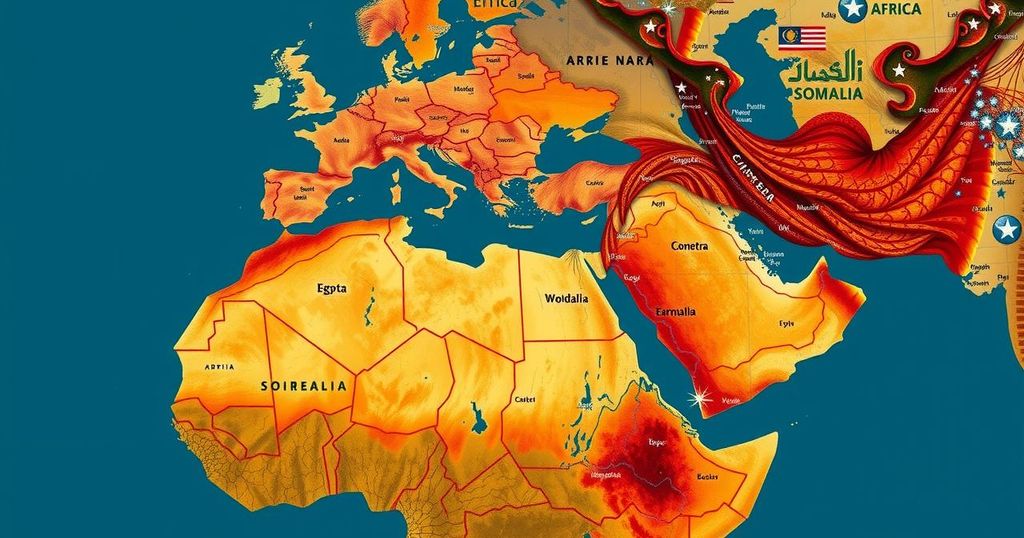The recent summit of Egypt, Eritrea, and Somalia in Asmara signifies a considerable shift in the Horn of Africa’s geopolitics, ostensibly aimed at enhancing regional stability while implicitly targeting Ethiopia amidst rising tensions over issues such as the Grand Ethiopian Renaissance Dam. The strengthening of military ties between Somalia and Egypt, coupled with Eritrea’s desire to re-establish its regional influence, indicates a realignment of power dynamics in a region characterized by historical grievances and ongoing conflicts.
The recent trilateral summit involving Egypt, Eritrea, and Somalia marks a significant pivot in the geopolitical landscape of the Horn of Africa, a region historically plagued by instability and competing interests. Convened in Asmara, Eritrea, the gathering sought to foster unity against prevailing regional security challenges; however, it subtly underscored the encroaching tensions with Ethiopia—Africa’s second-most populous nation and a pivotal player in regional dynamics. While the leaders—Eritrea’s Isaias Afwerki, Egypt’s Abdel Fattah al-Sisi, and Somalia’s Hassan Sheikh Mohamud—proclaimed intentions to enhance cooperation and uphold territorial integrity, the underlying intentions appeared to target Ethiopia, particularly in light of its ongoing disputes with neighboring countries. Ethiopia has frequently found itself at the nexus of regional power struggles, especially regarding its contentious interactions with Somaliland and its tensions with Egypt over the Grand Ethiopian Renaissance Dam (GERD). The potential proposed agreement allowing Ethiopia access to Somaliland’s coastline for naval and commercial purposes has stirred further discord, intensifying Somalia’s discontent due to its lack of recognition of Somaliland’s independence since 1991. The security partnership between Somalia and Egypt, solidified through a military agreement in August, highlights this evolving regional axis, with Egypt supplying military assistance to bolster Somalia’s defense against the al-Shabaab insurgency. Ethiopia’s links with its neighboring states appear increasingly frail as the Cairo-Mogadishu connection intensifies. Though Ethiopia was not openly addressed in summit conversations, the discussions implicitly reflected concerns regarding Addis Ababa’s regional ambitions, especially given Egypt’s entrenched opposition to the GERD. Egypt perceives the dam as a paramount existential threat to its water security, with negotiations over its implications stagnating. Egypt’s military presence in Somalia and the provision of arms serve dual purposes: stabilizing Somalia and countering Ethiopia’s expanding regional influence. Eritrea, often labeled the “North Korea of Africa” due to its isolationist stance, aims to augment its regional standing following its hard-fought independence from Ethiopia in 1993, yet remains ensnared in unresolved border disputes. Its strategic location near the Bab el-Mandeb Strait enhances its role in regional security efforts and in balancing the ascending power of Ethiopia, while Somalia’s alignment with Egypt is partly fueled by resentment towards Ethiopia. The Asmara summit signals a potential redistribution of power in the Horn of Africa, suggesting a departure from traditional alliances towards a cooperative military framework aimed at asserting dominance over Ethiopia’s growth. Despite proclamations of pursuing peace, Egypt’s maneuvering could indicate preparations for a proxy confrontation, employing Eritrea to undermine Ethiopia while avoiding direct conflict. Such dynamics raise serious security apprehensions for Ethiopia, particularly against the backdrop of potential escalations from extremist factions in Somalia. In facing these developments, Ethiopia must prioritize diplomatic engagement, most critically with Egypt and Eritrea, while leveraging international relations, particularly with the United States, which holds vested interests in maintaining stability in the region. Strengthening ties with regional partners, such as Kenya and Sudan, could provide Ethiopia with a necessary counterweight against the emergent alliances. A framework for collaborative management of Nile waters could mitigate existing hostilities; however, proactive public diplomacy will be essential for Ethiopia to clarify its strategic intentions and ensure its stability in a precarious environment.
The Horn of Africa is a region characterized by a long history of geopolitical shifts, marked by instability, ethnic conflicts, and complex inter-state relationships. Ethiopia’s role in the region has been central, driven by its demographic size and strategic interests, such as its engagement with the ongoing disputes over the control and rights to the Nile river waters. The dynamics are further complicated by internal conflicts, particularly the tensions between Ethiopia and its neighbors, notably Egypt, over the GERD, which is perceived by Egypt as threatening its critical water supplies. The historical grievances rooted in these relationships complicate the interactions among regional states, enhancing the volatility of alliances, particularly in light of recent developments.
In summary, the summit involving Egypt, Eritrea, and Somalia highlights a noticeable shift in the geopolitical alliances within the Horn of Africa. The collaboration among these nations appears intended not only to bolster regional security but also to encircle Ethiopia amid ongoing tensions surrounding its actions and regional ambitions. As Ethiopia grapples with these evolving alliances, the importance of diplomacy and strategic partnerships cannot be overstated. The outcomes of these interactions will significantly shape the future security landscape of the Horn of Africa.
Original Source: thehill.com






